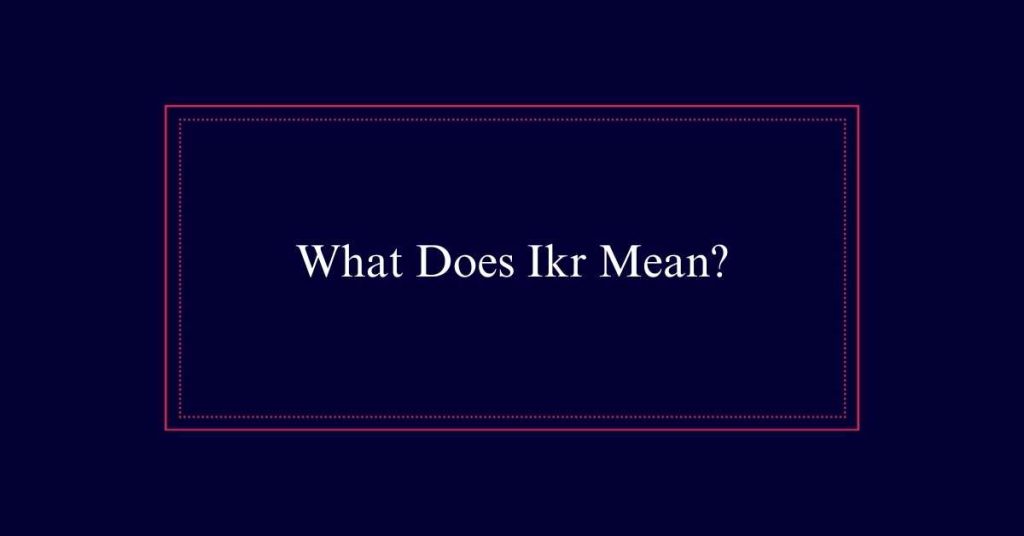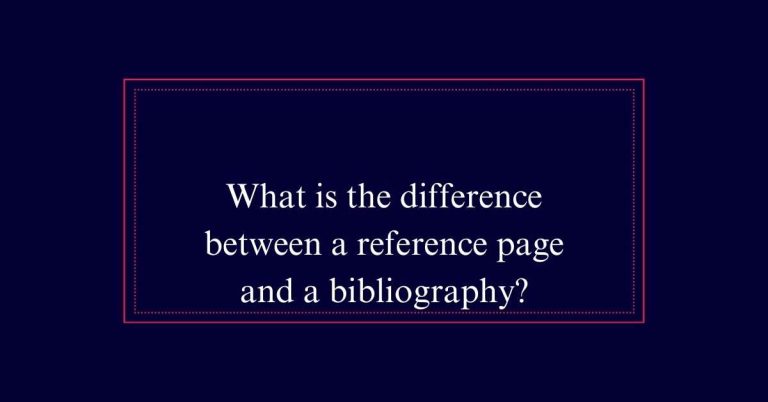What Does Ikr Mean?
‘Ikr’ stands for ‘I know, right’ and is used to express strong agreement or shared disbelief, often in digital communication. This abbreviation, which emerged in the early 1990s, highlights camaraderie and shared understanding. It quickly gained popularity due to its efficiency in conveying sentiments succinctly.
Today, ‘ikr’ is common in casual digital conversations, such as text messages and social media posts, particularly among younger audiences. It reflects modern communication trends that prioritize speed and ease of expression.
Definition of ‘Ikr’
The abbreviation ‘ikr’ stands for ‘I know, right’. It is used to express strong agreement or shared disbelief. When someone uses ‘ikr’, they are emphasizing their understanding and agreement with the preceding statement.
The addition of ‘right’ adds emphasis, similar to saying ‘isn’t it’. This abbreviation is prevalent in informal communication, especially in digital contexts like texting and social media.
It conveys feelings succinctly, often reflecting relief or camaraderie when someone shares a similar viewpoint. Importantly, ‘ikr’ should be written in lowercase without a comma between the ‘k’ and ‘r’.
It is a simple yet powerful way to connect with others and affirm shared sentiments in a concise manner.
Origins of ‘Ikr’
Emerging from the early 1990s, ‘ikr’ has its roots in electronic communication. The phrase ‘I know, right’ began to circulate in chat rooms and early messaging platforms. By 2004, it had been shortened to ‘ikr’ for convenience.
This abbreviation quickly gained popularity among internet users who wanted to convey agreement or shared disbelief succinctly. The ‘right’ in ‘I know, right’ adds emphasis, making the phrase more engaging. Critics argue that ‘ikr’ can alter the original meaning, but it remains widely accepted in informal contexts.
The evolution of ‘ikr’ reflects the broader trend of linguistic adaptation in the digital age, where brevity and speed are highly valued in communication.
Evolution in Communication
As ‘ikr’ evolved from early electronic communication, it exemplifies how digital interactions have reshaped language. The rise of the internet and mobile texting has led to the creation of many abbreviations and acronyms. These shortcuts make typing quicker and conversations more efficient.
Over time, phrases like ‘I know, right’ were compressed into ‘ikr’ to save time and space. This evolution highlights how informal communication adapts to new technologies. The use of ‘ikr’ shows the blending of traditional language with digital slang. It reflects how users prioritize speed and ease over formal grammar.

Usage in Modern Texting
In modern texting, ‘ikr’ is frequently used to convey strong agreement or shared disbelief. This abbreviation allows users to quickly express that they not only understand but also strongly agree with a statement.
It is often used to show surprise or amazement when someone else shares their view. The simplicity and brevity of ‘ikr’ make it ideal for fast-paced digital communication. It’s common in messages, social media posts, and online comments.
Informal Contexts
‘Ikr’ is primarily used in casual conversations, especially in digital communication. It often appears in text messages, social media posts, and online chats. The abbreviation helps express strong agreement or shared disbelief quickly and efficiently. Because ‘ikr’ is informal, it fits well in environments where people speak freely and less formally.
You might see ‘ikr’ in group chats among friends or in comment sections on social media. Its usage reflects a casual tone and is usually understood by younger audiences or those familiar with internet slang. The lack of capitalization and punctuation further emphasizes its relaxed nature.
Writing Rules
When using ‘ikr’ in writing, it’s important to follow specific guidelines to maintain clarity and proper usage.
To begin with, ‘ikr’ is best suited for informal contexts like texting or casual online communication. Avoid using it in formal writing, emails, or professional documents.
Next, always write ‘ikr’ in lowercase letters. There’s no need for all caps.
Third, ensure there is no comma between the ‘k’ and ‘r’. This maintains the acronym’s integrity.
Lastly, use ‘ikr’ to convey strong agreement or shared disbelief. Misusing it can lead to confusion.
Example Scenarios
Providing clear examples can help illustrate how ‘ikr’ is effectively used in various informal conversations. Imagine two friends chatting about a mutual acquaintance. One says, ‘Jane looks better with shorter hair.’ The other replies, ‘Ikr!’ This shows strong agreement.
In another scenario, a student texts, ‘There’s no chance I’m going to be ready for tomorrow’s quiz.’ A friend responds with ‘Ikr,’ sharing the same concern. These examples highlight how ‘ikr’ is used to convey shared feelings or disbelief.
When someone says, ‘He’s such a snob,’ and the response is ‘Ikr,’ it reinforces mutual disdain. These instances demonstrate ‘ikr’ as a powerful tool for expressing agreement and solidarity in casual dialogue.
Ikr’ Vs. ‘I Know
Understanding the differences between ‘ikr’ and ‘I know’ can enhance clarity in both casual and formal communication. ‘Ikr,’ short for ‘I know, right,’ is used to express strong agreement and often shared disbelief. It is common in informal settings, especially online or in text messages.
In contrast, ‘I know’ indicates general awareness or agreement without the added emphasis. It is suitable for both informal and formal contexts. ‘Ikr’ conveys a sense of relief when someone shares your feelings, while ‘I know’ remains neutral.
The use of ‘ikr’ can make conversations feel more personal and connected, whereas ‘I know’ maintains a more straightforward tone.
Common Misunderstandings
To conclude, people often misunderstand the use and purpose of ‘ikr’. One common misunderstanding is that ‘ikr’ turns a statement into a question. This belief arises because ‘right’ can sometimes imply a question. However, in ‘ikr’, ‘right’ is used for emphasis.
Another misconception is that ‘ikr’ changes the original meaning of ‘I know’. Critics argue that adding ‘right’ is unnecessary and confusing. Additionally, some view ‘ikr’ as informal and unsuitable for serious conversation. This leads to its being seen as redundant or overly casual.
Lastly, people often confuse ‘ikr’ with a question marker, which it is not. Understanding these nuances helps in using ‘ikr’ correctly.
Importance of Context
Despite these misunderstandings, the context in which ‘ikr’ is used plays a significant role in its interpretation. The abbreviation often appears in casual conversations, especially online or via text messages. In these settings, ‘ikr’ is widely understood to indicate strong agreement or shared disbelief.
However, its meaning can vary depending on the situation. For instance, in a humorous chat, ‘ikr’ can amplify a joke. In a serious discussion, it can show genuine empathy. Misinterpretation arises when the receiver is unfamiliar with the informal tone or the conversational cues.
Hence, knowing the context helps in grasping the intended emotion behind ‘ikr’. This aids in clearer communication and reduces the chances of misunderstanding the sentiment being expressed.
Frequently Asked Questions
Can ‘Ikr’ Be Used in Professional Emails?
Using ‘ikr’ in professional emails is not appropriate. It is an informal abbreviation better suited for casual conversations and texts. Professional communication should maintain a formal tone and avoid slang or internet shorthand.
Is ‘Ikr’ Appropriate for Social Media Posts?
‘IKR’ is appropriate for social media posts, as it conveys strong agreement or shared disbelief. It is widely accepted in informal communication online. However, it should be avoided in professional or formal social media contexts.
How Do Different Generations Perceive ‘Ikr’?
Different generations perceive “ikr” differently. Younger generations use it frequently in informal communication, while older generations may find it confusing or unnecessary. The younger cohort sees it as a quick way to express agreement or disbelief.
Can ‘Ikr’ Be Used in Spoken Conversations?
Yes, ‘ikr’ can be used in spoken conversations, though it is less common. When used verbally, it often appears in informal settings among friends or peers, reflecting the same agreement or shared disbelief as in text.






